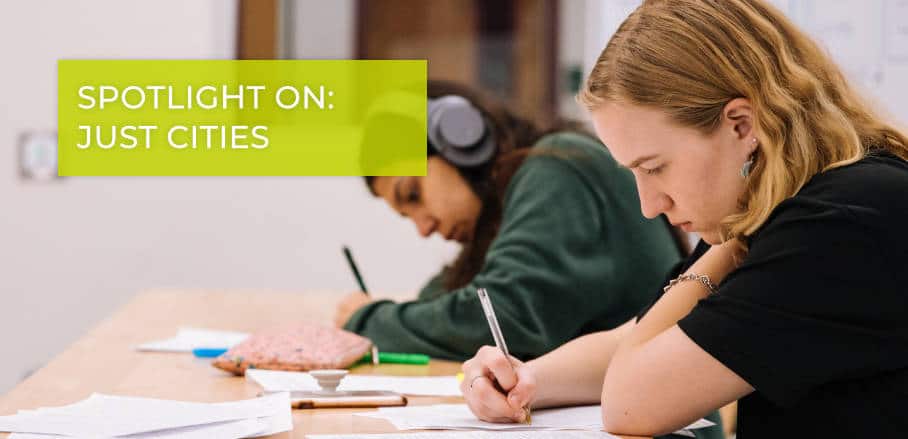Refugees in Towns: Strengthening Inclusion Through Education
How can cities include refugees and foster their civil participation? Access to education plays a key role. The Refugees in Towns project draws examples of best practices from around the world. By Jacob Ewing
Migrants and refugees can best settle into towns and cities and pursue sustainable livelihoods when their diverse experiences are represented in policymaking processes. The Refugees in Towns project (RIT) at Tufts University promotes understanding of the migrant and refugee experience by drawing on the knowledge and perspectives of refugees themselves as well as local host communities. By commissioning case reports written by migrants, refugees, and hosts, we identify the opportunities and challenges to migrant integration—including those that municipal governments face.
Cities often grapple with how to engage these new inhabitants, who may inadvertently cause anxieties about new and diverse cultures, security, and overstretched government service delivery among local populations. Migrants and refugees report that a city’s political climate—whether local actors are supportive or restrictive of migrant populations—influences where they ultimately settle. Figuring out how to meaningfully engage these populations is an important public policy tool to leverage the vast benefits migrant and refugee populations bring.
The Importance of Inclusive Education
Education is a fundamental human right that host countries are obligated to provide to refugees and migrants; improving access to education can also be an important entry point for strengthening integration. Cities and municipalities can use education policies to ease the entry of migrant and refugee children, improve cultural competency among citizens and migrants alike, and encourage parents to become involved in community affairs. Doing so creates benefits for refugees and migrants and the city as a whole.
For migrants and refugees, ease of access to quality education is an important factor when choosing transit and destination cities. Many RIT studies point to schools as central to social and economic integration, both for children and adults. Schools enable learning about local customs, culture, and history, as well as providing access to networks that offer information for future livelihood opportunities. This exchange is mutual—local students also benefit from exposure to diverse cultures, which can ease common anxieties and misperceptions about their new classmates. In the long run, this can create communities more conducive to refugee and migrant integration.
In Belgrade, Serbia, schools helped children learn the local language, providing a lifeline for family members who couldn’t communicate well with locals. Students adapted more easily and developed strong connections because of their educational experiences. In Cape Town, South Africa, some schools provide information about migrant- and refugee-serving non-profit organisations, enabling students and their parents to access helpful and important resources that support their integration.
Barriers to Access
There are, however, many formal and informal barriers to education in migrants’ new communities. The type and quality of education typically depend on people’s citizenship and residence status. In Belgrade, access to formal education is limited to asylum seekers and asylees with recognised legal status. In Irbid, Jordan, Syrian refugees are segregated in afternoon classes while Jordanian students attend morning classes, and Syrians are prohibited from working as teachers. In Cairo, Egypt, as well as Cape Town, families must provide passports or asylum documents to access school or graduation exams. These barriers not only prevent initial access to education systems but are also the basis for more insidious forms of discrimination. Such exclusion prevents parents from engaging further in formal public policy processes.
In Cairo and Cape Town, migrant and refugee students reported that local students had a poor understanding of other cultures, resulting in discrimination and mental and physical detriments. These range from social isolation to derogatory comments and pejorative nicknames to violent attacks. Some parents in Cairo reported their children had been assaulted with stones and broken glass.
Some migrant and refugee populations studied in the RIT project chose not to engage with education systems at all. This has several causes. In both Cairo and Irbid, Jordan, the perceived poor quality of public education put subsequent job opportunities in doubt. In Belgrade, parents believed their journey to other cities would soon continue, and for them, formal education was therefore not a priority at this stage of their journey. In Cape Town and Cairo, the request for specific documents discouraged families from seeking educational opportunities.
Improving Education Access and Public Participation
City governments have an opportunity to improve the livelihood opportunities of citizens and non-citizens alike by providing adequate access to education to migrants and refugees and by boosting the public participation of these communities through education. Potential solutions include:
Reduce formal barriers to education: Municipalities should review access to education policies and reduce barriers where possible. This includes removing documentation or status requirements, segregated school facilities or attendance periods, and language requirements. This ensures migrant and refugee students have access to education opportunities and strengthens social cohesion.
Implement migrant- and refugee-friendly curriculum: Municipal governments should require cultural competency training for educators and specific curricula acknowledging diverse communities, inclusive of migrants and refugees. This will benefit native and foreign students alike who may have little experience with diverse populations and may reduce discrimination based on race, ethnicity, or nationality.
Actively solicit the feedback of migrant and refugee populations: City and education leaders should actively seek the feedback of migrant and refugee populations to improve educational provisions and to improve feedback channels. For migrant and refugee parents, this can model future engagement in broader municipal policy processes while facilitating students’ integration.
Through such reforms, municipalities can build a sustainable foundation of participation and engagement in public policy and encourage the integration of future generations of citizens on the ground.
- Refugees in Towns: Strengthening Inclusion Through Education - 9. December 2021
